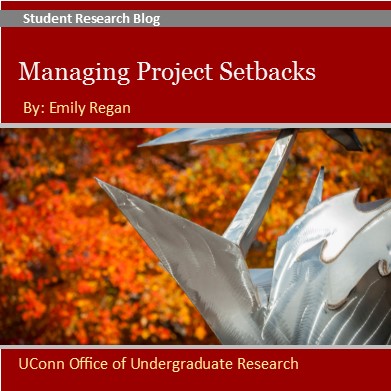By: Emily Regan, OUR Peer Research Ambassador
As with anything in life, research and creative projects are wrought with setbacks, surprises and even failures. No matter how carefully you plan, schedule or prepare, bumps on the road are inevitable. What’s most important is how you handle these setbacks, and what you learn from them.
When things deviate from the original plan, it can feel overwhelming and defeating. It’s important to have skills and strategies in place ahead of time in order to move past these challenges and be triumphant in your research or creative endeavors. Here are strategies that I’ve learned through my creative process that have helped me recover from setbacks and be successful in my project.
- Be flexible. Your project goals should be firm, but most cannot be set in stone. My project, writing and illustrating a graphic novel, is the first time I’ve taken on a project of this size. I have illustrated and written shorter comics and stories before in my classes and personal work but never to this extent. Despite my extensive research and preparation, there was no way for me to predict exactly what I was getting myself into, given that I had never done this before. Because of this, some of my plans have changed over the course of the project. It is very important that I allow myself to be flexible and open to these changes, for the sake and success of my project.
- Find creative solutions. Along with being flexible and open to change, it’s important to be ready to problem solve. When something goes wrong, it is easy to want to skip the challenging parts of the project, or worse, throw in the towel completely. Instead of losing hope, put your creativity to work and find solutions that you’re still excited about. When I was storyboarding my comic, the length got out of control. I had drawn far too many pages and needed to cut back significantly in order to make the project achievable. I was overwhelmed by the idea of cutting my story off or leaving out important details. I just wanted to throw away the story on which I had worked so hard and start over to make it simpler and easier. Thankfully, I reconsidered and instead, took another look at my script and drawings. I was able to condense certain parts, rewrite some dialogue and adjust some panel sizes in order to preserve the key aspects of my original story, just without some of the length. I am just as excited about and invested in my slightly altered story and was able to find a creative way to solve my problem without sacrificing my vision or giving up.
- Allow your inspiration to evolve. I originally planned to fully color my graphic novel in intense detail, but after speaking with my advisor and peers, I decided this was not the best option for me and was too time consuming for this project. At first I felt defeated. Things were not going according to my original vision, so what was the point? However, I snapped out of this when I realized there must be other paths I could take with my coloring that would be just as interesting while less time consuming. I searched through comic books, graphic novels and all over the internet to find alternative coloring styles. I picked the brains of my professors, advisor and peers about the different methods they use to color their drawings. I discovered examples of limited color palettes, black and white illustrations, grayscale coloring and so many more options that I had never even considered. In searching for these methods of coloring, my inspiration and vision evolved and the project became not only more manageable but also better overall because my horizons had been expanded by my newfound inspiration.
There are countless ways for things to get off track in a research or creative project. However, there are also countless ways to fix and improve your project, and skills, when these challenges are encountered. Making yourself aware of these strategies ahead of time will help you be more prepared for the inevitable setback, and will allow you to move past them more quickly and with more knowledge and ability than before.
Emily Regan is a junior majoring in studio art with a concentration in illustration. Click here to learn more about Emily.